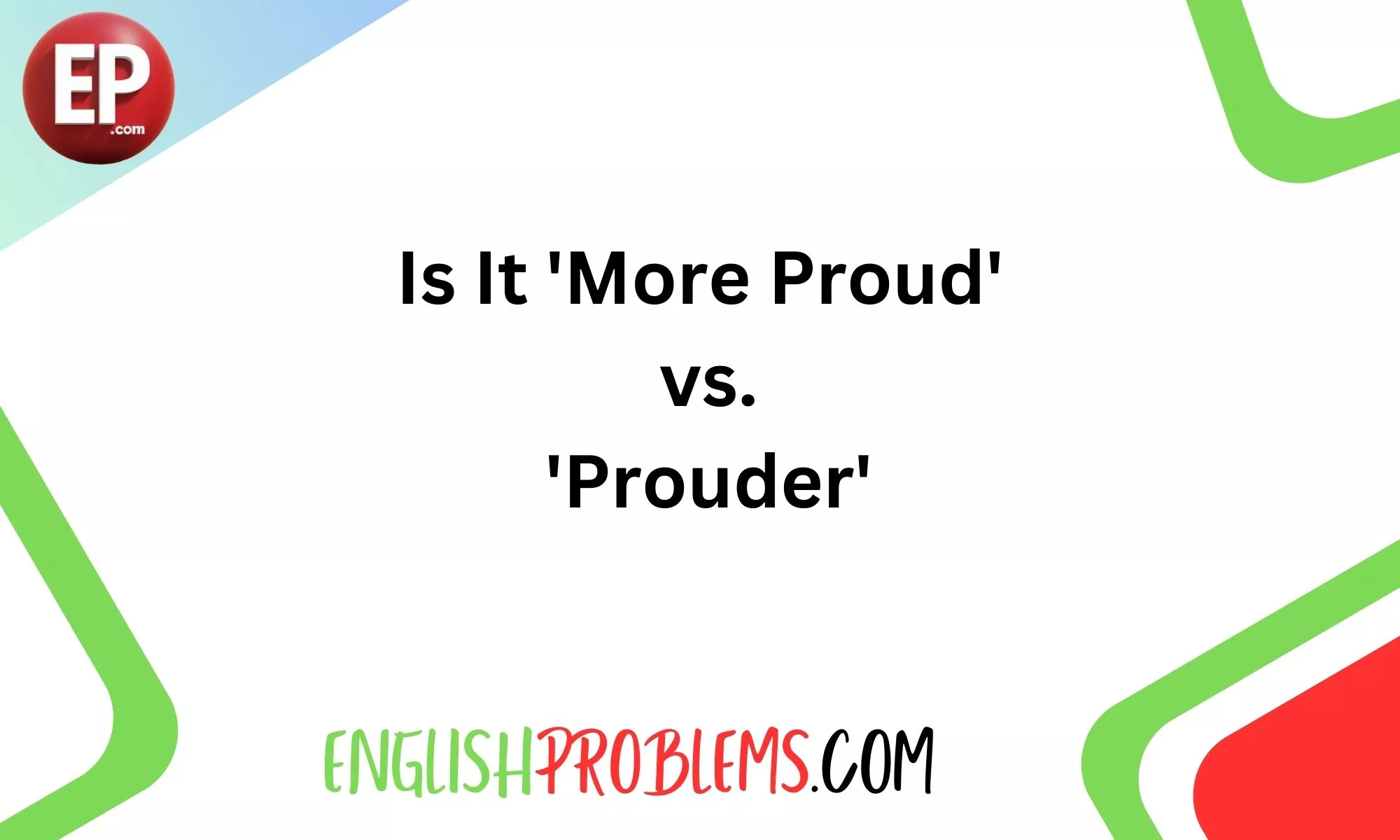Comparative adjectives play a crucial role in English, helping us express differences and comparisons. But when it comes to using “prouder” or “more proud,” confusion often arises. Understanding when and how to use these comparative forms can enhance your communication skills and help you avoid common grammatical pitfalls.
This comprehensive guide explores the nuances of comparative adjectives, specifically focusing on “prouder” and “more proud.”
Understanding Comparative Adjectives in English
Definition and Basics
Comparative adjectives are used to compare differences between the attributes of two nouns. They help us express that one thing has a greater or lesser degree of a particular quality compared to another. For example:
- Fast becomes faster (comparing speed)
- Bright becomes brighter (comparing brightness)
In general, the formation of comparative adjectives follows specific rules:
- Single-syllable adjectives typically add “-er” (e.g., small becomes smaller).
- Multi-syllable adjectives generally use “more” before the adjective (e.g., beautiful becomes more beautiful).
The Specific Case of ‘Prouder’: When and How to Use It
Grammar Rules
For single-syllable adjectives like “proud,” the comparative form is created by adding “-er”. Therefore, the correct form is “prouder,” not “more proud.” This rule is straightforward but often overlooked, leading to confusion.
Here’s a quick table summarizing the formation of comparative adjectives:
| Adjective Type | Rule | Example |
| Single-syllable | Add “-er” | Proud → Prouder |
| Multi-syllable | Use “more” + adjective | Beautiful → More beautiful |
| Ending in “y” | Replace “y” with “i” and add “-er” | Happy → Happier |
Contextual Usage: Examples of ‘Prouder’ in Sentences
Understanding the context in which to use “prouder” is essential. Here are some examples to illustrate its correct use:
- “She was prouder of her accomplishments than anyone else.”
- “As the team won the championship, the coach couldn’t have been prouder.”
- “He felt prouder every time his child achieved something new.”
These examples demonstrate the correct usage of “prouder” in different contexts, emphasizing comparison between two entities or states.
The Emotional Nuance of ‘Couldn’t Be Prouder’
Expression Analysis
The phrase “couldn’t be prouder” carries significant emotional weight. It’s an idiomatic expression often used to convey a deep sense of pride that seemingly cannot be surpassed. For example:
- “After seeing her daughter perform on stage, she couldn’t be prouder.”
This expression is more emotionally charged than simply saying “very proud” or “more proud.” It implies an intense, almost overwhelming feeling of pride.
The Debate: Is ‘More Proud’ Ever Acceptable?
Grammatical vs. Colloquial Usage
While “prouder” is the grammatically correct comparative form, “more proud” can occasionally appear in informal speech or writing. This is especially true in contexts where emphasis is needed, or in poetic or stylistic expressions. However, “more proud” is not standard English and should be used cautiously.
For instance, in a casual conversation, someone might say:
- “I’m more proud of you than you can imagine.”
Here, the speaker emphasizes the degree of pride in a conversational manner. In formal writing, however, “prouder” remains the preferred form.
When to Use ‘Prouder’ vs. ‘More Proud’
Guidelines and Considerations
To determine whether to use “prouder” or “more proud,” consider the following guidelines:
- Formal Writing: Always use “prouder” in formal contexts, academic writing, and professional communication.
- Informal Writing and Speech: “More proud” can occasionally be used, especially if it serves a particular stylistic or emphatic purpose.
- Clarity and Precision: When in doubt, choose “prouder” for clarity and adherence to standard grammar rules.
Understanding Single-Syllable Adjectives and Their Comparative Forms
General Rules and Exceptions
Single-syllable adjectives generally form comparatives by adding “-er.” This is a simple yet essential rule in English grammar. However, there are a few exceptions, particularly with irregular adjectives like:
- Good becomes better
- Bad becomes worse
These irregular forms don’t follow the standard “-er” or “more” rules and must be memorized.
Debunking the Myth of ‘More Prouder’
Common Mistakes
One common mistake is the use of “more prouder,” which combines both comparative markers (“more” and “-er”). This form is grammatically incorrect and should be avoided. It’s essential to remember that only one comparative marker should be used at a time.
For example, saying:
- “He is more prouder than his brother.”
is incorrect. The correct sentence should be:
- “He is prouder than his brother.”
Geographic and Dialectal Variations: ‘Prouder’ vs. ‘More Proud’
Global Perspectives
The use of “prouder” and “more proud” can vary across different English-speaking regions. While standard grammar rules apply universally, some dialects may show a preference for one form over the other. For instance:
- American English: Typically adheres to “prouder.”
- British English: Also favors “prouder,” though informal usage of “more proud” can occasionally be found.
- Other Dialects: Variations might exist, but they are not widely recognized in formal settings.
This regional variation highlights the importance of understanding the standard rules while being aware of colloquial differences.
Conclusion
Recap and Key Takeaways
In summary, the correct comparative form of “proud” is “prouder.” This follows the standard rule for single-syllable adjectives. While “more proud” may appear in informal contexts, it is not grammatically standard and should be used with caution. Understanding these rules enhances clarity in communication and ensures precise expression of comparisons.
Call to Action
As you continue to refine your English language skills, practice using comparative adjectives correctly. Share your own examples or questions about comparative forms in the comments below. Remember, mastering these nuances can significantly improve your writing and speaking abilities.
Additional Resources
Links to Further Reading
- Merriam-Webster’s Guide to Comparative Adjectives
- Grammarly’s Article on Comparatives and Superlatives
FAQs Section
Q: Can “more proud” be used in formal writing? A: No, “more proud” is not standard in formal writing. Use “prouder” instead.
Q: Are there exceptions to the rules for forming comparative adjectives? A: Yes, irregular adjectives like “good” (better) and “bad” (worse) are exceptions.
Q: Is “more prouder” ever correct? A: No, “more prouder” is incorrect as it redundantly uses two comparative markers.
By understanding and applying these rules, you can confidently navigate the complexities of comparative adjectives, ensuring clear and accurate communication.

Freya Hughes is a dedicated language enthusiast who turns grammar lessons into enjoyable learning experiences. Her approachable and friendly manner ensures that even the most daunting grammar rules become accessible to all.










